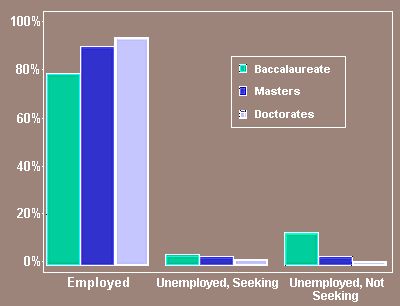Generally speaking, any improvements in your
education will similarly affect your employability. (Although higher degrees also tend to
generate higher salaries, this is not a perfect linear relationship.)
 BA info from Chartbook of Degrees Conferred, 1969-70 to 1993-94. US Dept of Education, National Center for Education Statistics, Office of Educational Research and Improvement (NCES 98-071). MA info from 1996 Survey: Psych Grads with Masterís, Specialist, and Related Degrees, Research Office, APA. PhD info from 1997 Doctorate Employment Survey, Research Office, APA. | |
| Masters | There are a variety of reasons somone might decide to go for
the master's degree instead of the doctorate degree (some by choice, others by necessity). Choice: You may decide to stop with a master's degree because the job you want doesn't require a PhD, but does want education beyond the BA/BS degree. In fact, we (MSU Psychology) have placed many master's graduates into nice positions with only a master's degree already (and continue to do so each year). Choice: You may not be sure that graduate school is what you want to do with your life, so to give it a test-run, you may choose to dabble with a master's program somewhere first. Choice: You may want to pursue a graduate education while a spouse (or significant other) attends school as well. There may not be enough time for a PhD, but sufficient time for an MA. Necessity: You may not have done very well as an undergraduate. Consequently, your grades may not make you look very attractive to PhD programs. You believe you are capable and decide to demonstrate your capability by successfully completing the requirements of a lower-level graduate degree (MA). After this, you can apply to PhD programs with better scholastic credentials (and usually with much greater chances of being accepted).
Necessity: You may not be able to find a doctoral program that specializes in your area
of interest. |
| Doctorate | The reasons for completing the requirements for the most
advanced degree possible are fewer in number. Generally, students who are pursuing a PhD have
a really good idea of what they want to do for their career (e.g., research, academics,
industry, private practice, or combinations of these). As you can see from the figure above, most PhD's are employed. The pay is usually (BUT NOT ALWAYS) better. It's great to hear people call you "Doctor" and it tends to make parents beam with pride. On the down side, it may cost more (contemplate decades of student loan payments), it will surely take more time (which means that you could be well into your 30's or older before you can even seriously think about settling down somewhere), and it can be very stressful on maintaining romantic and social relationships with those outside your field of study.
Also note that once you are a highly trained professional, and depending on your career choice,
you may end up having to move a great distance away from your family in order to be
employed. |